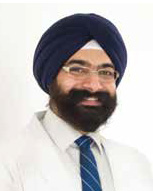AIOS can go the #MeToo way!

Dr. Digvijay Singh, MD, Faico
Director, Noble Eye Care
Gurugram
In the face of increasing violence against doctors, which has occasionally ended up with fatalities, there is a need for urgency when it comes to reacting to an escalating situation. At the same time there is a need for restraint and proper ethics when interacting with a patient of another doctor. This need for urgency and restraint is recognised by the IMA and other bodies which have certain response teams and ethics committees which quickly get to action if a situation so demands. Probably, AIOS could take a cue.
The IMA has an emergency response team in various cities which reaches within a short span after a distress call by a doctor. This team generally consists of doctors who practice in that city/area along with some office bearers of the local IMA body.
The team has come to the rescue of several doctorsover the course of a few years. An ophthalmologist who didn’t want to be named, describes an incident in Gurgaon (a part of the national capital territory) where a senior ophthalmologist was being blackmailed by some police personnel for extracting money after a case was filed against him. Apparently, he was planning to perform a cataract surgery under peribulbar anaesthesia. During the process of giving the block, the needle accidentally perforated the globe and some block was injected which led to the eye losing vision. The attendants were infuriated when informed about the complication and despite pacifying efforts, retorted to aggressive behaviour. They lodged a police complaint and rather than manage the violent crowd, the policemen tried to pressurise the doctor to pay them in exchange for helping settle the matter. At this time, the doctor called up a few offic bearers in the local ophthalmological society who sought the help of a local IMA team to resolve the situation without undue prosecution.
The IMA response team has also come to the rescue of an ophthalmologist in Uttar Pradesh. A member of the IMA response team describes that a few years ago, a well-known ophthalmologist of the region ended up with a postoperative endophthalmitis after operating on the eye of a local political leader. When explained about the seriousness of this sight threatening condition, the local leader along with his supporters turned rowdy and forcibly dragged the ophthalmologist to the police station (in liaison with some senior police officials). However, due to some urgent calls to the local IMA response team, even before the police could reach the police station with the ophthalmologist, a score of doctors and associates reached there and made the SHO to release the ophthalmologist after explaining that this complication is well known and can be managed. Later, a settlement was reached with the patient after an apology by his attendants and an arrest of the most violent miscreants.
Dr Vinod Biala, a senior ophthalmologist practicing in Ghaziabad is a member of the local IMA ethics committee there. This committee evaluates and makes decision regarding possible unethical or unacceptable etiquettes of doctors. He mentions that in many cases of violence, it has been found that patents get agitated when they take the opinion of a second doctor, after some complication, and the second doctor knowingly or unknowingly blames the first doctor. The patients and attendants sense that something wrong may have been done purposefully and often get violent towards the first doctor. It is in situations like this that the ethics committee may intervene and warn the second doctor to show restraint. “Sometimes in the rigmarole of a busy practice and increasingly competitive world, we may forget basic ethics and this can instigate violence” says Dr Biala.
It is stories like these that make a point for AIOS to have local rapid response teams and ethical committees in every major city. It also is a reason why every ophthalmologist should be part of the society and meet and socialise with other colleagues regularly. There is little doubt that violence against doctors is on the rise and will continue to increase given the pressure on the healthcare system and lack of stringent punishments for miscreants. As ophthalmologists and doctors we need to be members of local and national societies and these societies need to be strong, in order for us to fight this menace. Many a times, in a bid to maintain our self-respect and reputation, we doctors do not come forward and seek help when faced by violence, but that should not be the case. AIOS and other local societies can help us come out of the closet with respect to violence on doctors. We need to step up and talk about such incidents and possibly we may see a #MeToo style campaign for this too.